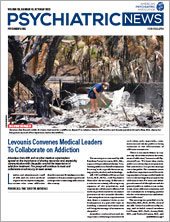People who have experienced cancer are often referred to as survivors. But not all the patients with whom Guy Maytal, M.D., works after their cancer treatments identify with that term, he said.
“If I say to you that I’m a cancer survivor, what you may assume is that my cancer experience is in the past, it’s over, and I’ve survived some ordeal,” said Maytal, chief of Integrated Care & Psychiatric Services at Forge Health and a clinical assistant professor of psychiatry at Weill Cornell Medical College.
But in truth, Maytal said, patients experience many psychological repercussions of cancer well after their treatments are over. A
recent meta-analysis published in
JAMA Pediatrics supports his assertion. The study found that children, adolescents, and young adults who survive cancer may be more likely to experience depression, anxiety, and psychotic disorders such as schizophrenia after cancer remission compared with their peers and siblings who did not have cancer. The study was conducted by Cyrus Ho Su Hui, M.B.B.S., Ph.D., an assistant professor and consultant psychiatrist at Yong Loo Lin School of Medicine at the National University of Singapore, and colleagues.
The researchers conducted a systematic review of studies published from 2000 to 2022 in PubMed, MEDLINE, Embase, PsycINFO, CINAHL, and PubMed Central. The studies measured risk and/or severity of depression, anxiety, psychotic disorders, and death by suicide in children, adolescents, and young adults with cancer compared with those who did not have cancer, which could include family members or matched controls. The studies included both patients currently receiving treatment for cancer and cancer survivors. Those receiving cancer treatment were no older than 25 years, and those who were cancer survivors received their cancer diagnoses when they were no older than 25 years.
The authors analyzed 52 studies. Youth with cancer had a significantly increased lifetime risk of severe depression symptoms, anxiety, and psychotic disorders compared with both family members and matched controls. Additional findings include the following:
•
The risk of severe depression or anxiety symptoms was elevated regardless of the participant’s age at cancer diagnosis.
•
Depression severity was elevated in youth receiving active cancer treatment and cancer survivors.
•
Anxiety severity was elevated in youth receiving active cancer treatment, but not in cancer survivors.
•
Certain subpopulations of youth with cancer or a history of cancer had a significantly increased risk of suicide mortality, particularly those diagnosed between the ages of 15 and 19 years.
•
Several studies found significant associations between lower educational levels and increased risk of mental illness or suicide; lower income and increased risk of depression, anxiety, or both; and partnership status and lower risk of depression and anxiety.
“These findings are not a surprise for those of us working in this field,” said Chase Samsel, M.D., medical director of the psychiatry consultation service at Boston Children’s Hospital and affiliate staff member with Pediatric Psychosocial Oncology and Palliative Care at the Dana-Farber Cancer Institute.
Many children and adolescents are getting at least some psychosocial treatment, Samsel said, “but if you talk to the psychiatrists, psychologists, or social workers doing this work, they’ll tell you it’s still not enough,” he continued. Some institutions have robust programs to support pediatric oncology patients and their families, while many do not.
The brain is still developing until around age 25, so undergoing cancer treatment can have a significant impact on patients’ life trajectory, pointed out Maytal, who is a member of APA’s Council on Consultation-Liaison Psychiatry. “One of the psychological tasks of adolescents and young adults is to define themselves as independent of their family,” he said. “That’s very difficult to do when you’re so totally dependent on your family and the medical system during cancer treatment.”
A childhood cancer diagnosis is an adverse childhood event, Samsel said. “We know from the established literature in psychiatry that the more adverse childhood events, stressors, and traumas that children experience, the more likely they are to develop a host of psychiatric illnesses,” Samsel said. He emphasized the finding that participants whose households had lower incomes or lower educational levels had a greater risk of mental illness.
“I can’t write a prescription to give a family more money during this stressful time or to create a social network for them within their communities,” Samsel said. “I can’t tell you how many parents of these patients lose their jobs or go into significant credit card debt because of these diagnoses. The number of GoFundMe’s that families need tell the story of what we see in this meta-analysis.”
When a child survives a cancer diagnosis, there is an understandable desire within our culture to think that the fight is over and the story has a happy ending, Samsel said.
“The sad news is that it isn’t done, and this study underscores that there is a lot of work that needs to be done in our communities and in our practices to help these patients.” ■

